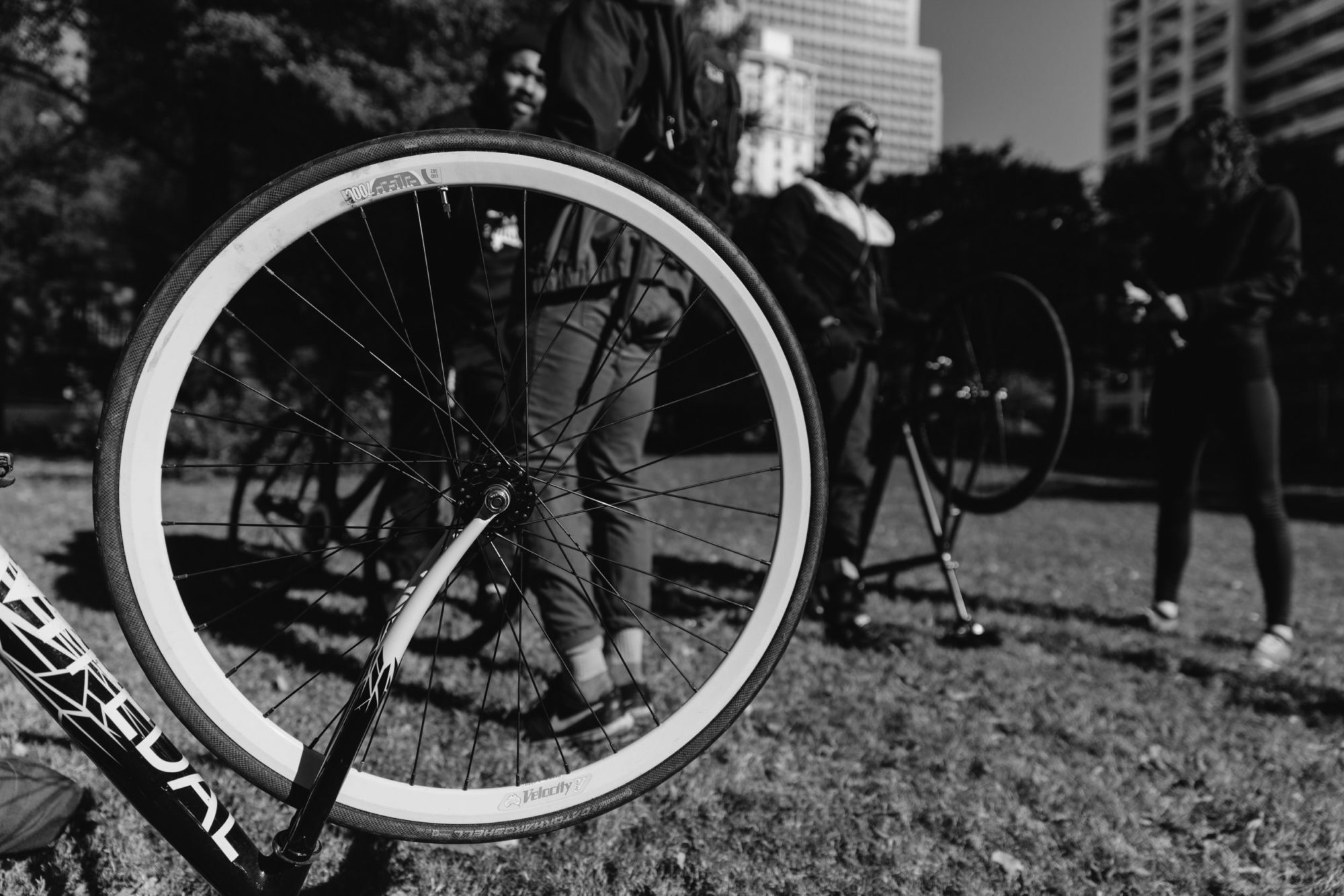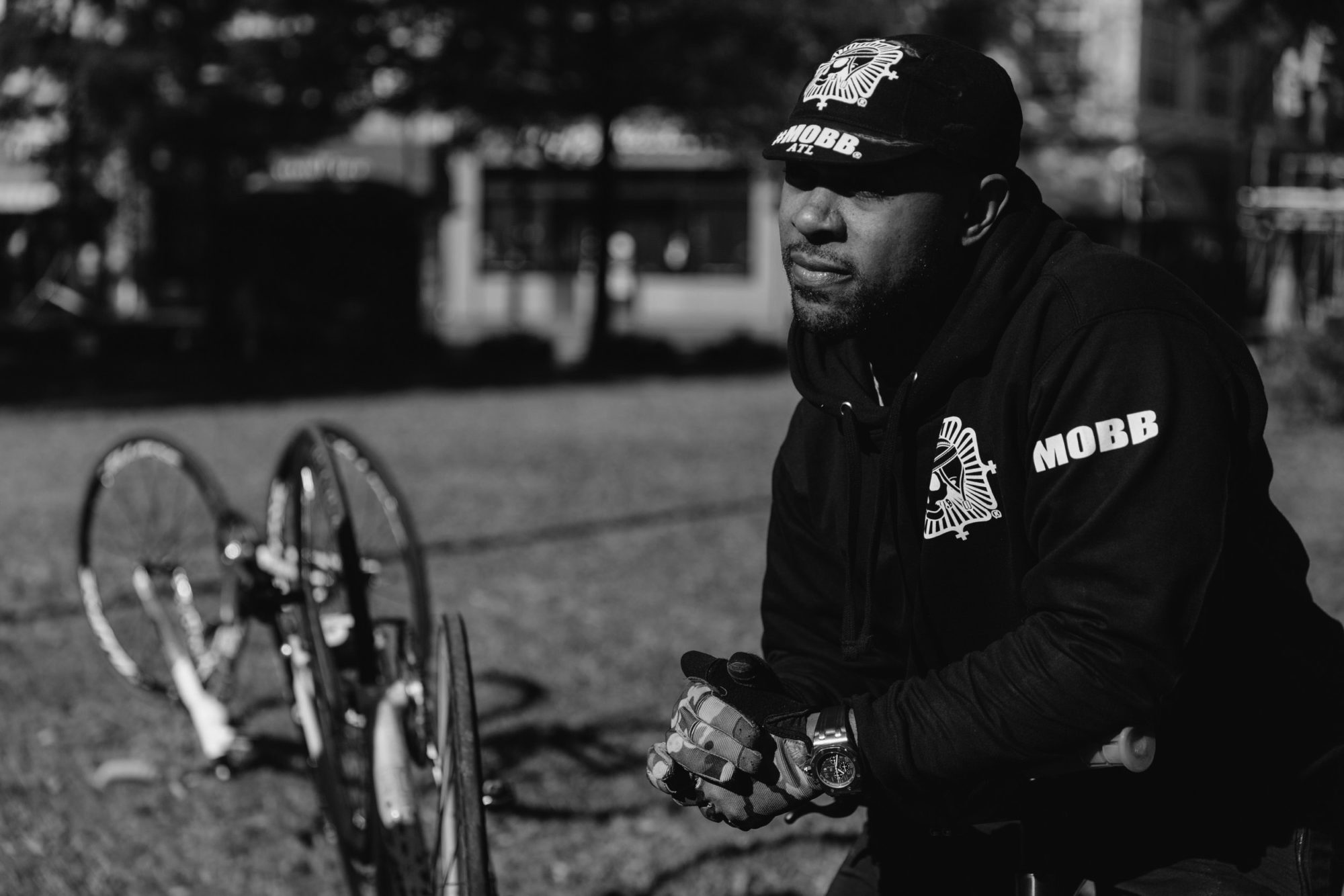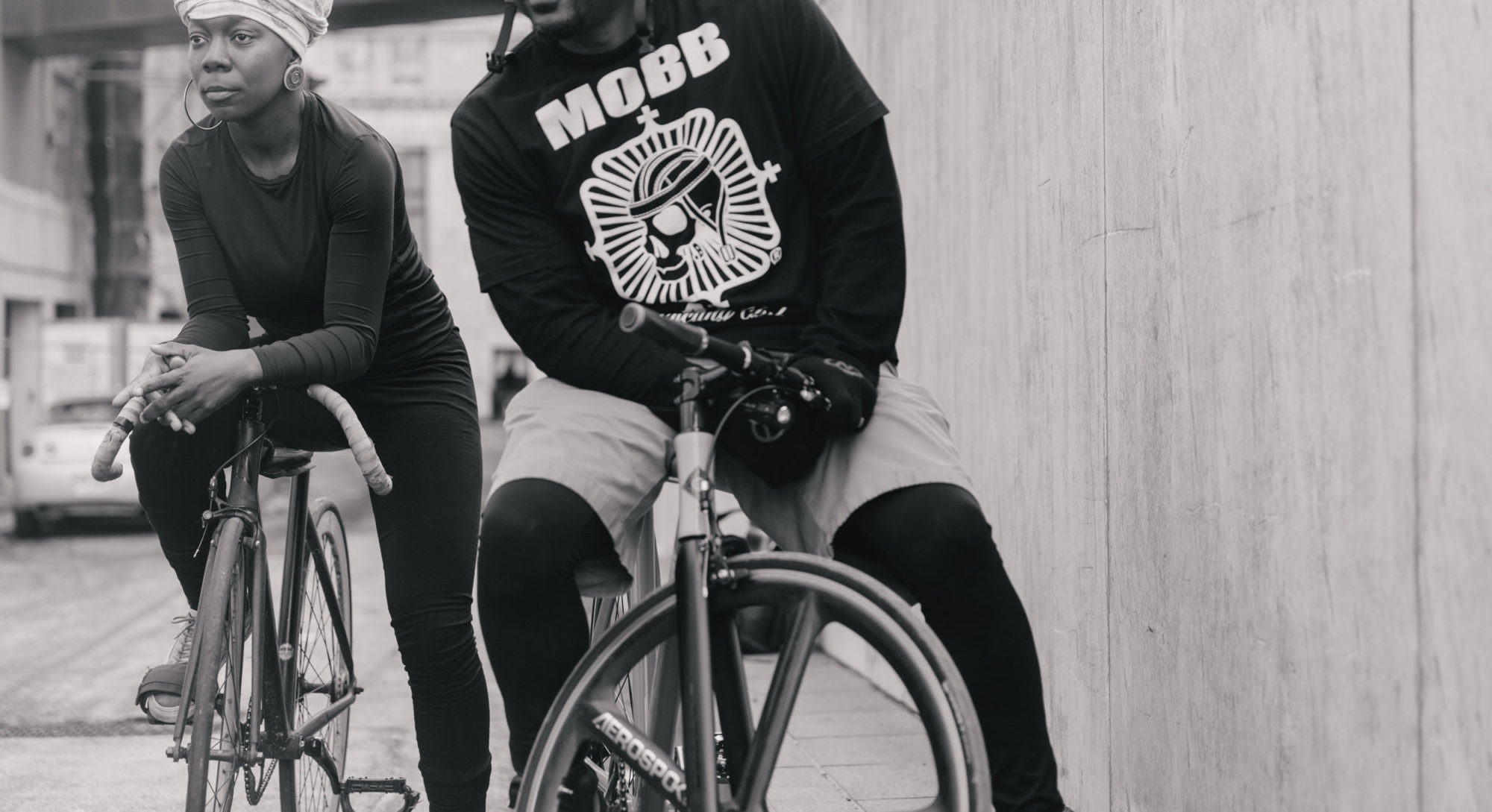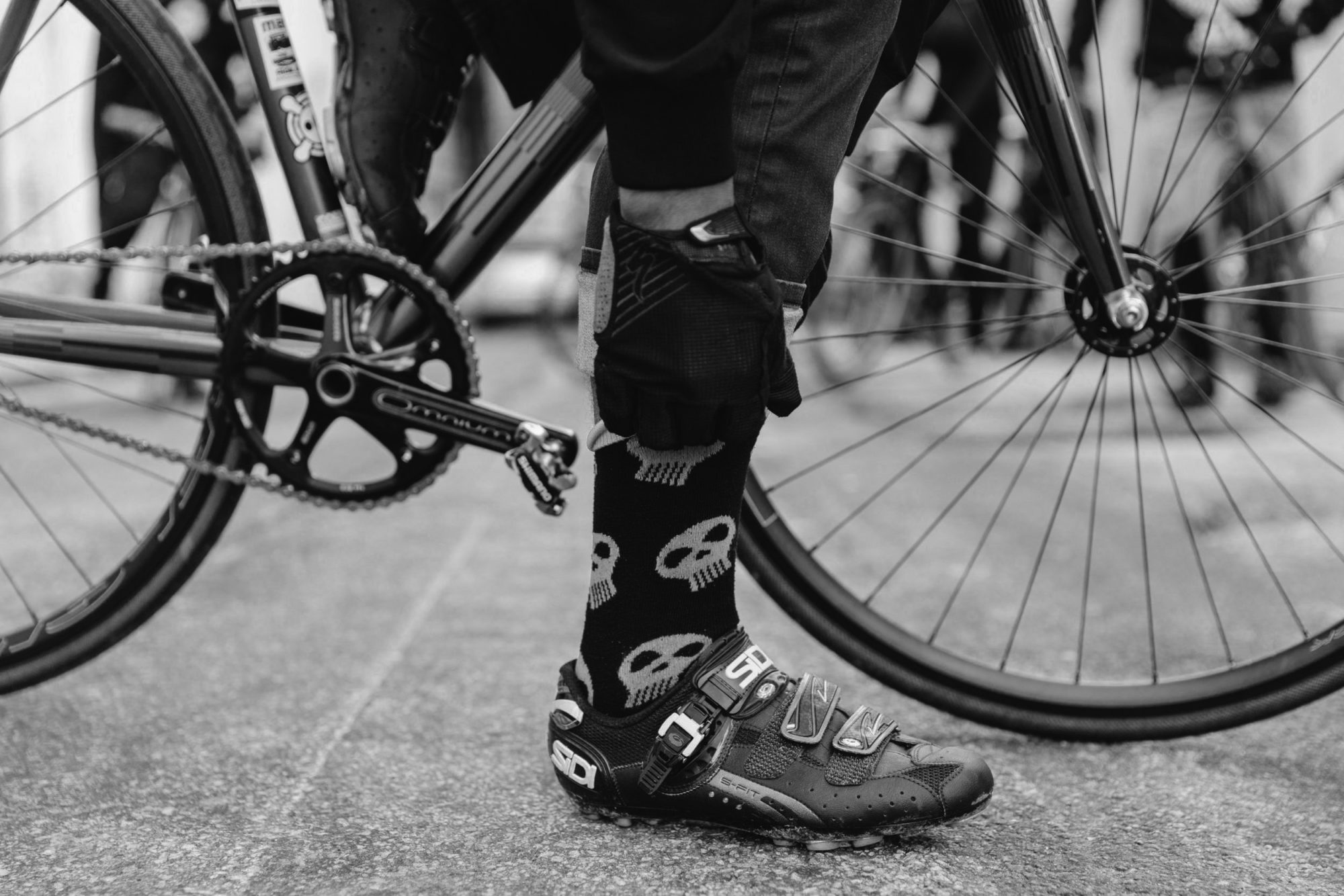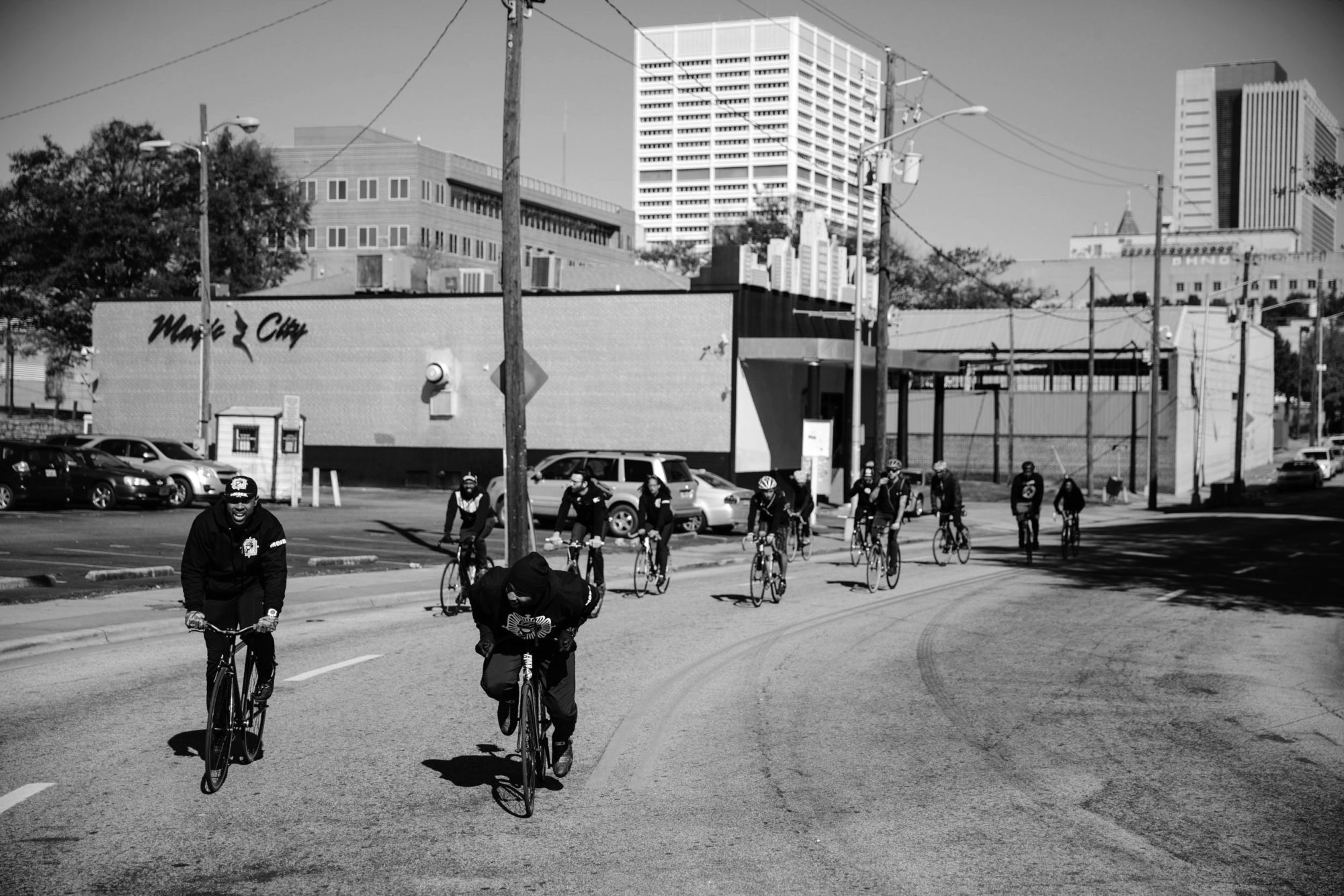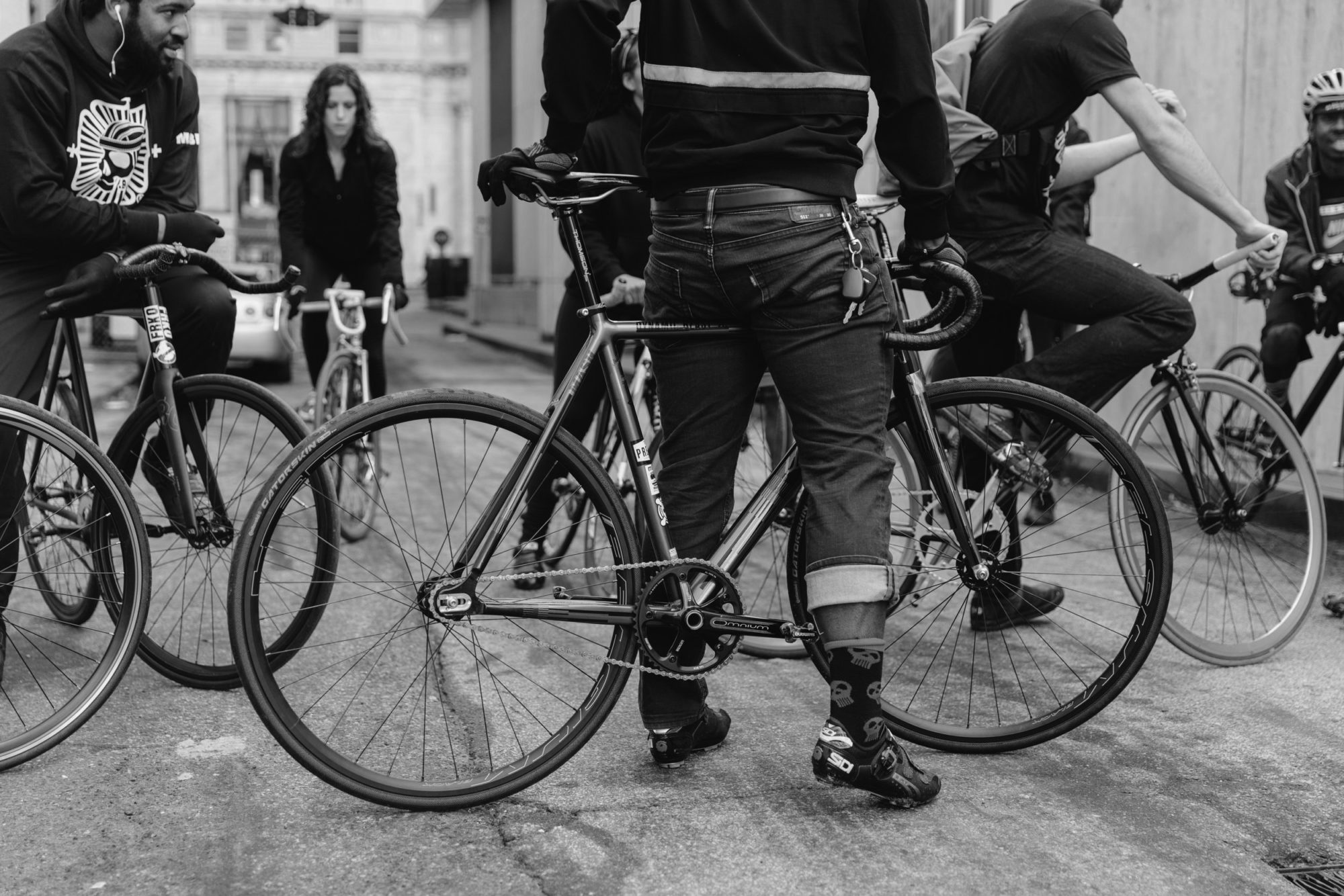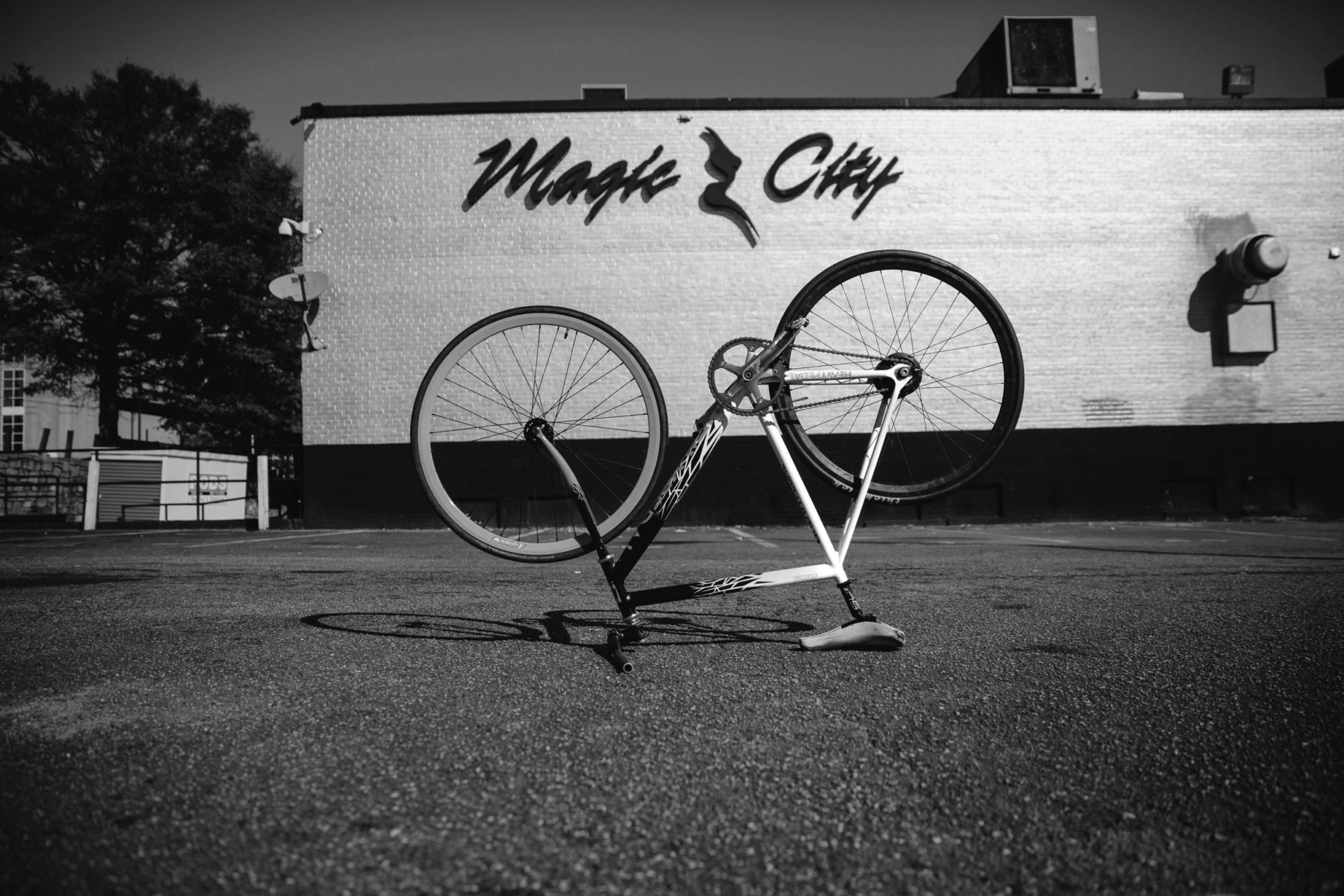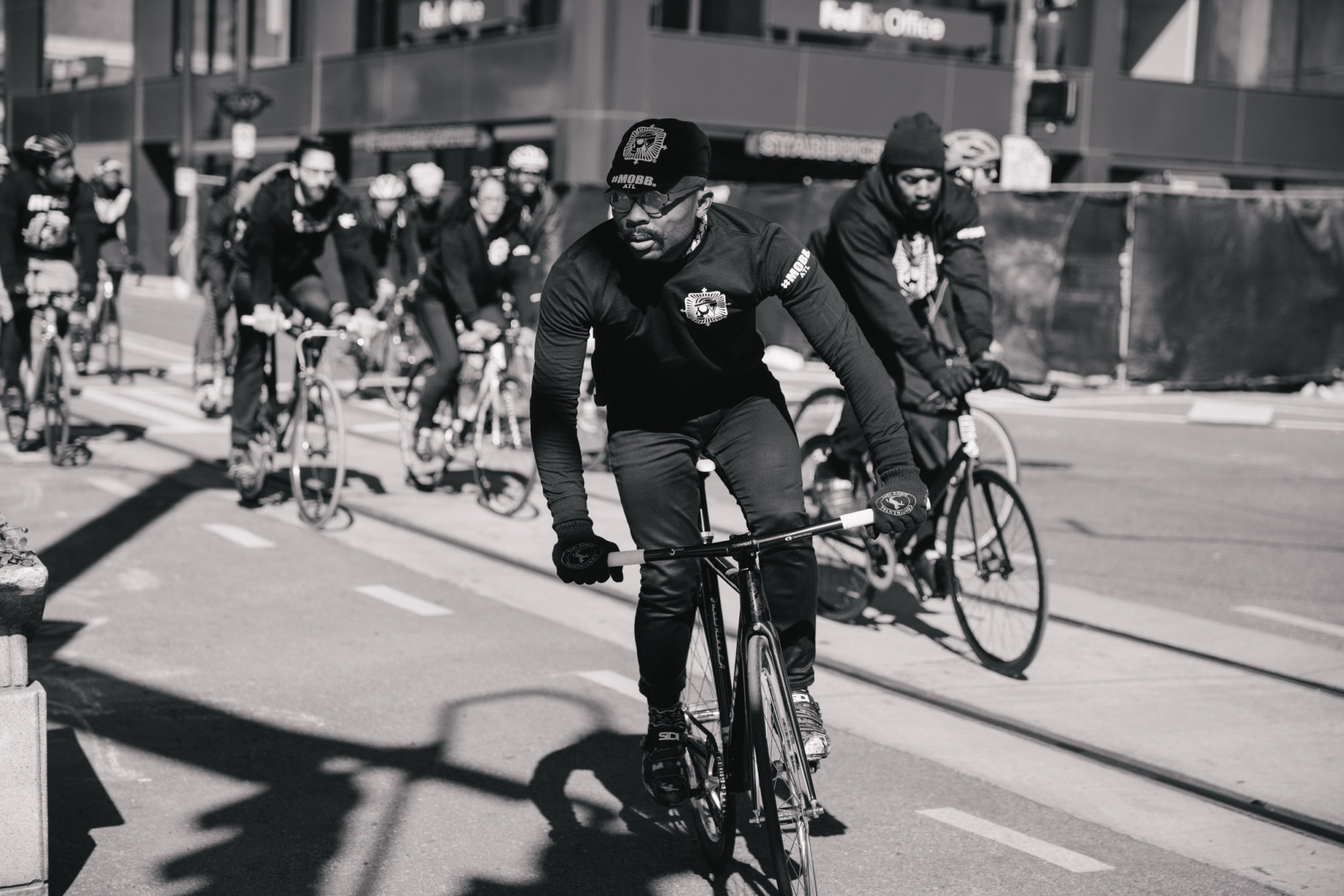Black Folks on Bikes
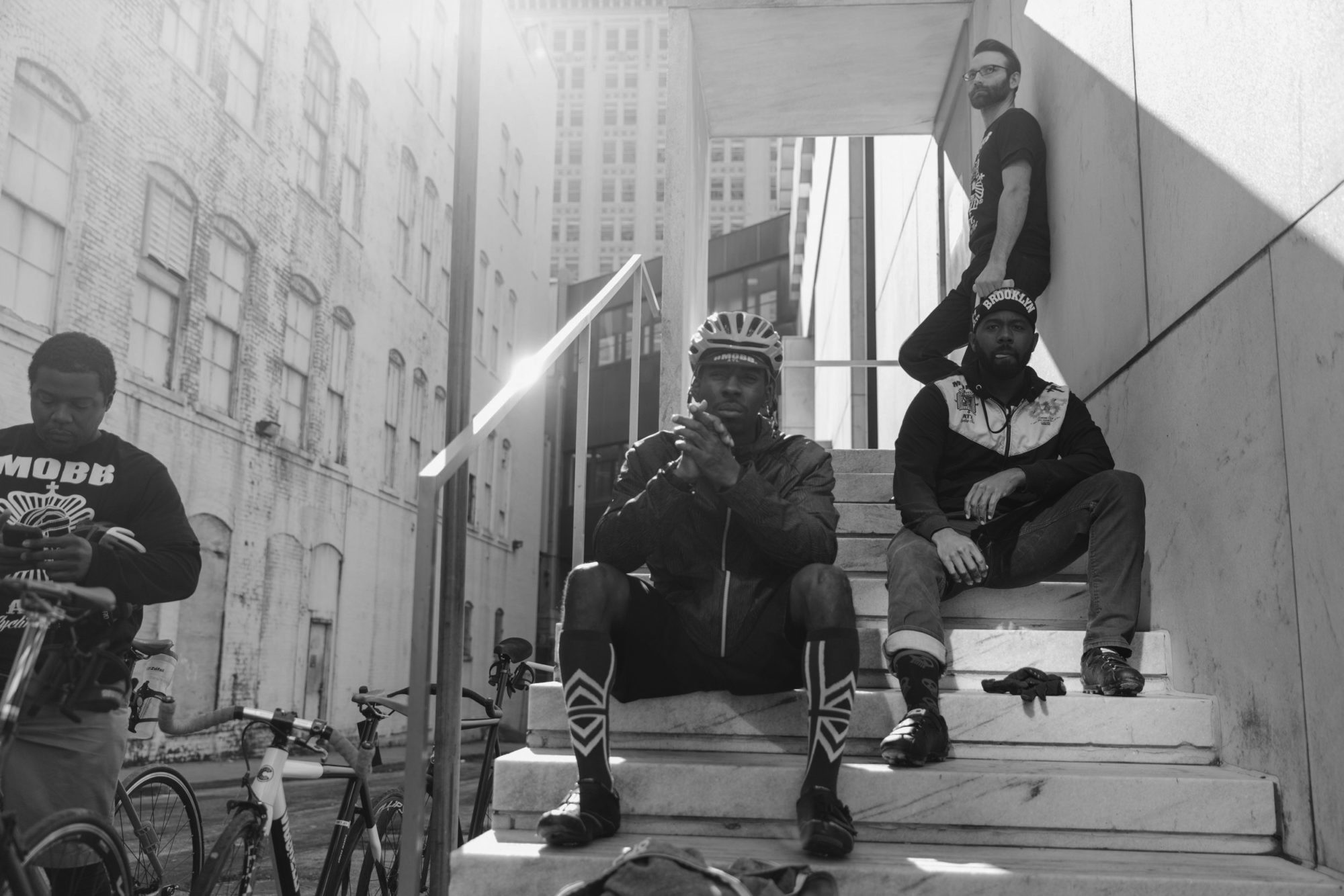
Individual profiles highlight the diversity and activism fueling the Atlanta bike community (the fastest growing in the United States). An accompanying photo essay follows MOBB-ATL Cycle Club on a ride through the city's still car-dominated downtown.
Share:
Sometimes it’s hard to see beyond the stereotypes of a growing global biking culture with its visual representation, flowing primarily from places such as Amsterdam and Portland. A more diverse picture of who is riding bikes, however, can be found in cities everywhere: the biking landscape in such American cities as Los Angeles and Detroit, and such countries as South Africa and Colombia, reveal a culture that is much richer than what appears in those mainstream images.
Atlanta is a fast-growing city, but of all the reasons people are flooding to the “A,” biking isn’t one of them. (Let’s keep it real: the hills are loyal.) But biking has still found a home in the city. Atlanta hired its first Chief Bicycle Officer in 2015 and put money into such projects as a bike share program; bike commuting in the Georgia capital increased by 400% in the first decade of the 2000s and continues to grow. Some of the city’s least recognized riders are also among those people leading this movement, both consciously and unconsciously engaging the frontlines of change and dispelling the dominant imagery, which would have you believe that hipsters or white middle-aged men in spandex are the only ones out there on bikes.
Who you are can determine what you see, no matter what you’re looking at. Look closely at Atlanta, however, and you’ll see what I always see: black folks on bikes.
We’re not the typical demographic that is researched, marketed to, or represented in the media, but we’re a big part of the city’s growing bike culture. Atlanta has a multitude of black bike entities: Black Girls Do Bike, Aztec Cycles, WeCycle-Atlanta, MOBB-ATL, Metro Atlanta Cycling Club, Clutch BMX, and Red Bike & Green-Atlanta are just a few examples.
The diversity of these groups alone begins to dismantle stereotypes of what cycling looks like in Atlanta and across America. I asked seven people from different bicycle groups, backgrounds, and philosophies to describe why they bike, what challenges they face because they do, and what the future of bike culture looks like to them.
Nedra Deadwyler
The Historian Rider
Civil Bikes
civilbikes.com
Talk about Civil Bikes’ goals.
Civil Bikes is still forming and evolving … but I think Civil Bikes will address all kinds of issues … social, physical, health, artistic, creative, historical, gender, racial. Life is complex; a bike is simple. And using it as a tool to address something so complex brings things down to scale. Riding a bike allows us to engage and connect with the world and the people around us, and breathes the possibility for more positive things to develop from those interactions.
What does “biking while black” mean to you?
I am me and while riding I’m just taking in the world, lost in thoughts. It’s other people’s perceptions of me that define “biking while black.” If it’s judgment about my skill level, knowledge; if my bike is stolen or if I ride for economic reasons — that’s the other person’s issue, not mine. Being a sensitive person — black, woman — I’ve dealt with others’ perceptions, and at this point I refuse to deal with it. Not my issue. This is why I love doing a bike tour that uses history to look at the city, offering commentary and giving others the space to talk. Race comes up for sure.
Black bike groups, like all bike groups, have purpose: [they are about] building community, facilitating ways to address social concerns, providing solutions, and giving the collective a voice. [We know] they are effective, because the numbers of black people on bikes in Atlanta continues to rise.
What is your vision for the future of biking in Atlanta?
Atlanta should not become [New York City] or Seattle.
Anamarie Shreeves
The Earth-Friendly Rider
Fort Negrita
fortnegrita.com
What is your biking story?
Less than a year after [my] finishing college, my Toyota Corolla burnt out on the [Baltimore-Washington] Parkway in Maryland. Limited on funds and unimpressed by the lack of electric cars on the market, I figured this would be the perfect time to lower my carbon footprint by using alternative means of transportation — including a bike. I moved to Atlanta and bought a bike with my second or third paycheck. It has taken me to places in Atlanta that a car driver will never experience.
I’m a zero-waster, which means I reduce my waste consumption, including food, energy, and water waste. By riding a bike I refuse waste from various industries — air pollution, health care costs, crude oil, and land for parking lots. Driving a car [emits] chemicals including carbon monoxide, nitrogen dioxide, sulfur dioxide, PM-10 particles, benzene, and formaldehyde, but when I am on my bike, I’m just burning energy. The only thing that would be better about my biking experience would be if I could convert that energy into something I can use. Wouldn’t it be cool if I’m riding my bike, and it powers a traffic light?
What does “biking while black” mean to you?
Oh my, yes! I’m laughing, but I really feel like a target while riding my bike. I try to erase it from my mind, but with social injustice in the media, class injustice on your block, and white America’s oblivion [to it all], it’s clear that a sista on a bike ain’t a sight to behold for folks. I feel people driving by not giving me proper space, blowing their horns and stuff. I’ve even gotten cursed out! I don’t think that would happen to me if I was a white guy in them sporty get-ups.
Kenneth Florence
The Bike Ninja
Red Bike & Green-Atlanta
redbikeandgreen.org
How did you come to use this machine in your life?
I started riding bikes as a child in the country for fun with my cousins. As a youth I got a mountain bike that I ultimately used in my adult life to run errands. Once in Atlanta, I used my bike in a similar fashion. As I got acclimated to the city and became social, I met people who were like myself and rode bikes. They were not your traditional road cyclists; they were my 20/30-something culturally and politically engaged peers who have alternative opinions. This newfound group of people rode with Red Bike & Green-Atlanta (RBG-ATL), a community-building collective of black urban cyclists seeking to improve their physical and mental health, the economy, and the local environment of African Americans by creating a relevant and sustainable black bike culture. Through RBG-ATL I started to learn a lot about the laws and rules of cycling in Atlanta. I also became more of a bike enthusiast. I eventually upgraded my bike and started to use it as my primary mode of transportation and for work.
[Today], I ride to make and save money. I ride for the sense of accomplishment I get when I do something difficult on a bike. I ride for the physical benefits. I ride because I am having a positive impact on the Earth by reducing my carbon footprint.
You use your bike to earn income — what is that like in Atlanta?
In Atlanta it is difficult to make money using your bike. Most people are not going to be able to do it, but it can be profitable. The avenues to make money as a bike messenger or delivery person have been scarce, but recently there has been an influx.
I’ve worked for corporate entities as well as independent local companies. Being a bike messenger works for me, works really well because it plays to my artist lifestyle. Typically the nights are for working on my craft, and the four-hour day shift is for making money. Although the money fluctuates, it has proven to be beneficial to me financially, artistically, and physically.
“Biking while black” — what does that mean to you? Have you experienced any inequities/injustices as a black person using a bike?
Yes, both by witnessing another black cyclist be harassed by the police and by just showing up into white biking spaces and being prejudged based on not fulfilling the cycling stereotype. Biking while black means living while black. Basically the life experiences that I have as a young black man are the same whether I am on a bike or not.
Can you talk about the challenges of riding a bicycle in the city of Atlanta?
Them hills, lol — the hills in Atlanta are drawling. They will be everyone’s challenge, or what deters people from even considering riding a bike.
What would you like to see the city’s Chief Biking Officer do for the Atlanta bike scene?
I’d like to see her push efforts for mass transportation, because it is the best friend to cyclists. It makes streets safer and less congested.
Jaylen Nelson
The Commuter and Race Rider
What is your biking story? How did you come to racing?
I started cycling about 2.5 years ago on a Schwinn road bike. After that bike was stolen from me while [I was] working an overnight shift, I bought my first fixed-gear bicycle. After spending about [seven to eight] months on that bike and wanting to build a bike from the frame up for the first time, I sold the Aventón and decided to invest in the 57cm Bianchi Super Pista I ride today. I didn’t think about racing until I got a fixed-gear bike and found out that people were racing on the roads that I was riding on daily. It made sense, because I was already riding fast to get from one destination to another. Through the inspiration of friends and the opportunity to compete with other riders, I was on it. I’ve placed first in the fixed-gear category in all three street races I’ve completed.
What’s your experience like at the velodrome as a black racer?
There’s a different sense of a need to do well as a black racer, because there are so few of us that consistently compete. It only pushes me even harder to prove myself as a force to be reckoned with. I have the support and camaraderie of two other black riders who also race at the velodrome. We train together and race together. We push each other to do better.
What is your vision for biking in Atlanta?
My vision for biking in Atlanta is for anyone who participates in the amazing activity that is cycling to be able to do so without the worry of being harmed by a driver on the road. We all have places to get to on a daily basis, and our goal is to make it to these destinations safely. My vision is for drivers to value the lives of people on bikes just as much as they would a person in another car. #BikeLivesMatter
Tif R. Smith
The Liberated Rider
Red Bike & Green-Atlanta
How did you get involved with RBG-ATL?
In the spring of 2014, a friend told me about RBG. All she said was it was black folks biking the city of Atlanta. It was all I needed to know. After my first ride with them, I decided to become more involved in the logistics of the organization. I have been biking and feeling empowered doing so ever since.
Do you see biking as a tool for social justice and liberation?
Prior to joining RBG-ATL, I did not see the collective power in biking. But through our work and intentional planning, every time we ride it is an act of black resiliency …. Biking is a tool for liberation. Rather than biking in primarily well-to-do neighborhoods, RBG intentionally rides in black neighborhoods. We spend our money at black businesses, and we give black people the opportunity to use their bodies in ways they may [not have] if they were not with RBG. We as bikers use our time and energy to uplift one another and we pay attention to the displacement of our people here in Atlanta, especially through gentrification.
We ride with purpose and intention. We ride on a mission of representation, solidarity, and pride. There is a specific synergy that happens when we ride together, and it personally liberates me.
“Biking while black” — what does that mean to you?
Black folks have been riding bikes for a long time, but because many of us are not riding $1,000-plus bikes and are not driving our Prius to the bike meet-up to unload our bike to ride, but as necessity for work, we are ignored. If you see us riding our bikes collectively, it’s a blessing. It is such a counter-narrative to popular beliefs about who rides bikes in Atlanta, both for leisure and necessity. “Biking while black” looks dope. It looks carefree and it is unapologetic about blackness, while also expressing joy in the physical sharing of space with other black cyclists.
Kenneth Oladapo
The BMXer
Clutch BMX Shop
clutchbmxshop.com
What is your bike story? How did you come to ride BMX, and to make it a career?
I had a bike when I was about seven or eight. I would ride it all the time, jumping, whatever. I got into BMX when was about 13, and I’ve been riding ever since. Clutch [BMX Shop] is my brainchild. It’s a work in progress, and I still have a long way to go. No bike shop around has a BMX section—they have access to the product, but you’re not gonna get rich off just selling BMX parts. I’d like to be the go-to resource for BMXing in Atlanta. I ultimately want a retail spot that focuses on BMX products and repair for all bikes, and that would also be social space …. But finding an affordable location to house Clutch is not easy.
What is the BMX bike culture like in Atlanta?
BMX in the city really isn’t that big. It’s spread out: Atlanta has two skate parks, and they don’t allow bikes. [City of Decatur] has a park that allows bikes—that’s where I grew up riding—and Gwinnett County has plenty of parks that also allow bikes, too. I’d love to see BMX get bigger in the city. The BMX scene is small compared to what it used to be. People grew up and stopped riding.
How has biking in Atlanta in general changed since you started riding?
It has grown a lot, which is cool to see. There are bike lanes everywhere now. The Beltline is slowly coming along. Atlanta is becoming a bike city, but has a long way to go.
“Biking while black” — what does that mean to you?
I’ve never had anything like that ever come up. I did have one guy ask, where did [you] steal that bike from? I thought that was kind of funny, though, and we ended up becoming good friends after that.
Tahra Chatard
The Fixed-Gear Enthusiast
MOBB-ATL
facebook.com/MOBBATL
What is MOBB? How did it come to be?
MOBB is a collective of urban riders. When I started riding, it was only with one other person. Months later, in Los Angeles, I participated in my first group ride and fell in love with it. The distance was the greatest I had ever completed at that point (30 miles), and the best part was the sense of community that I felt from complete strangers. We broke bread together afterwards, exchanged jokes, and discussed social issues over beer. I was both inspired and encouraged to start a crew in Atlanta. I wanted to replicate the experience. Through biking, I met other people who had similar interests, so we started riding together. Eventually, other people joined us.
We started MOBB Weekend [in 2014] … for a simple reason: we wanted to hang out with our friends and do cool shit on bikes. [After] we enlisted our friend, Alonso Tal (of the Leader Bikes Team, Los Angeles) to come down and host our inaugural race, he suggested we throw a weekend of cycling events and after-parties. Through his relationships, we were able to bring in national sponsors that no one else in Atlanta had previously secured (Chrome Industries and Leader Bikes, among others). [In 2015], we brought a couple more professional riders in along with Alonso: Sean Martin (The Heavy Pedal, San Francisco) and Massan Fluker (Low Bicycles, New York City). The prizes were grander, and the parties were greater. We hope it continues to grow and people enjoy themselves while getting to know the folks they see in magazines, advertisements, and documentaries.
“Biking while black” — what does that mean to you and to MOBB?
I haven’t experienced inequities on my bike that differ in any way from my daily existence while on foot. Of course, being black in America, I have always understood that one has to be “better than” in order to be considered equal or, in many cases, even capable. Maybe that’s why we, MOBB, always strive for excellence in our presentation. Our logo is dope. Our graphics are dope. Our bikes are dope. Our race is dope. Our rides are even dope. We always have fun. Everyone is welcome, and no one is left behind.
zahra alabanza is the co-founder of the Atlanta chapter of Red Bike & Green. She sees biking as a tool for communal and individual transformation, and a means of building and rebuilding whole communities that are abundantly safe, confident, well(thy), and self-determining.
Zach Wolfe is an Atlanta-based photographer and director.
